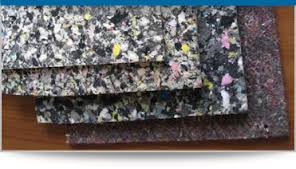Foam padding (urethane) This type of pad is very inexpensive and lightweight. If a retail store tries to give you free pad with your carpet purchase, just say “No thank you”. This type of padding will not tolerate much traffic. It will soon become completely flat as a pancake after a year or so. This is often used in apartment settings where the carpet life span is less than 3 years.
Prime urethane foam Not made of recycled materials, this type of pad is called prime or virgin urethane. It’s a better grade of foam pad (frothed foam) that could be a good choice for the home. It is made of very dense urethane (polyurethane). It is designed primarily for commercial applications, but is becoming more common in residential applications. The cost more than a standard rebond and not a common choice among homeowners.
Wool or fiber pad, synthetic fiber pads These types of natural wool or synthetic pads are used primarily for Berbers and commercial carpets. They are very dense, breathe well, and are not spongy at all. They are made from recycled or shredded fabrics or natural wool. They are designed to support and allow looped Berbers and commercial carpets to wear well in heavy traffic situations, and to prevent these types of carpets from stretching out and developing wrinkles. A synthetic fiber pad is also a great choice for basements with concrete floors as it breathes well, resists mold and mildew and has anti-microbial properties.
Rubber pad (waffle) or Rubber slab (flat) We don’t recommend using a rubber waffle pad in residential applications. Rebond pad is a much more economical choice and it does a great job at supporting your carpet as long the correct thickness and density is selected. Rubber slab padding is often used in commercial applications over concrete. Rubber padding density is usually rated in ounces.
Specialty pads: Moisture barrier pads, odor eating pads, pet odor pads, baking soda pads, Some carpet salespeople may try to convince you to upgrade your order with a specialty pad that has claims of being able to eliminate odors or have a moisture barrier surface that will help with pet accidents. I don’t generally recommend these type of pads and suggest you avoid the extra expense. I believe it will just cost you more money and not solve or diminish your pet accident problems. If you have a pet accident problem there is no padding on the market today that I know of, that will solve your problem. Spending more money on a specialty pad will likely not reduce the severity of your pet accident problem.



0 Comments